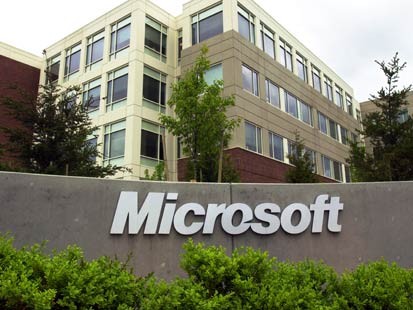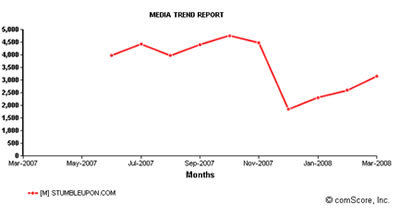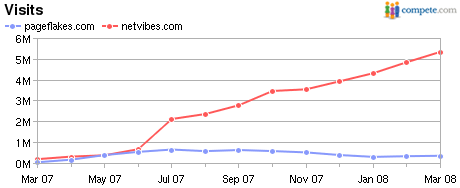Demand Media, a major buyer and operator of Internet domain name companies, has announced just a few days ago it has acquired the Austin-based social media company Pluck after about reportedly two months of negotiations. The price is $75M in all cash deal. Pluck revenues are around $10 million/year and the company has raised $17 million  in three rounds of funding, which makes the deal a nice exit for Pluck’s investors among which are Austin Ventures, Mayfield Fund, and Reuters. Michael Arrington from Techcrunch however does not seem to agree with that constatation and calls it that way: VCs who aim for 3x their money tend to go out of business.
in three rounds of funding, which makes the deal a nice exit for Pluck’s investors among which are Austin Ventures, Mayfield Fund, and Reuters. Michael Arrington from Techcrunch however does not seem to agree with that constatation and calls it that way: VCs who aim for 3x their money tend to go out of business.
Pluck, a provider of social media tools and technologies, is serving more than 200 media websites, which are reaching over 100M users, and serving over 1.5 billion interactions per month. The acquisition expands Demand Media’s social media platform beyond its owned network of web sites to power leading media properties and brands worldwide including Gannett/USA TODAY, Guardian Unlimited, Hearst Corporation, Fox, The Washington Post, Scotts and Circuit City.
“We founded the company with a vision for expanding social media beyond the traditional social networking portals. To that end, we have acquired and developed the components necessary to create, distribute and monetize web sites and content,” said Richard Rosenblatt, co-founder, CEO and chairman of Demand Media. “Now, we are ready to expand the platform and model beyond our proprietary network. Pluck provides the technologies, people and partners to accomplish this vision.”
Demand Media’s social media platform currently supports more than 64 million unique visitors per month according to the company’s own Google Analytics data from January 2008. The platform features multiple social media applications such as social Q&A and a vast wholly-owned and rights-cleared content library of Pro Amateur text and video. All this will be enhanced by Pluck’s widget and API-based social media technologies.
“This combination will allow us to provide our customers with an even broader suite of social media products and monetizable content,” said Dave Panos, CEO of Pluck and executive vice president for Demand Media. “The combined expertise of our two companies in platform technology development, content creation and community management is truly un-matched.”
Since its inception in May 2006, Demand Media has raised over $350 million in equity capital and pioneered a new formula for building an interactive media company. Through its social media platform, Demand Media has grown its vertical network into one of the Internet’s largest.
Pluck was founded in 2003 and built a world-class social media platform that enables leading publishers, brands, and retailers to grow their audiences by seamlessly integrating content, community and social media technologies directly into their existing web properties.
More about Pluck
A leader in social media software solutions, Pluck helps transform how publishers, retailers and major brands engage their audiences and customers to discover, create and distribute information online. Providing the technologies for content generation, syndication, social networking and news personalization, Pluck helps its customers more easily consume and leverage the new open content model that has emerged as the cornerstone of Web 2.0.
Products
If your goal is to drive brand recognition and revenue by leveraging the power of user contributions and interaction on your web site, Pluck offers a complete suite of rich Social Media products called SiteLife. Ready for embedding into any web site, SiteLife helps build vibrant communities of active bloggers, citizen journalists and consumers while driving the creation of new content, traffic and repeat visits.
For bloggers and publishers, Pluck offers BlogBurst, a syndication service that places blogs on top-tier online destinations. With BlogBurst, publishers weave the rich and diverse fabric of the blogosphere into their sites to drive site traffic, while bloggers gain visibility and grow their audience and reach.
Management Team
Pluck was co-founded in 2003 by Dave Panos and Andrew Busey, two executives with entrepreneurial experience in some of the industry’s earliest efforts in instant messaging, real-time collaboration, e-commerce, and e-learning. Meet the Pluck management team.
Dave Panos – Chief Executive Officer, Co-founder
Â
A software industry veteran with more than 16 years of start-up experience, Dave has helped define new markets across a range of Internet and Enterprise sectors. He co- founded Pluck as a Venture Partner at Austin Ventures. Previously, he was a co-founder and executive vice president for B2B eCRM provider Question Technologies (sold to Motive). For seven years, he was vice president of marketing and business development at web collaboration pioneer DataBeam before their successful sale to Lotus/IBM. Previously, Mr. Panos ran product management at Easel Corporation, a popular software development tool company that went public. He earned his MBA from Harvard Business School and his undergraduate degree from Furman University.
founded Pluck as a Venture Partner at Austin Ventures. Previously, he was a co-founder and executive vice president for B2B eCRM provider Question Technologies (sold to Motive). For seven years, he was vice president of marketing and business development at web collaboration pioneer DataBeam before their successful sale to Lotus/IBM. Previously, Mr. Panos ran product management at Easel Corporation, a popular software development tool company that went public. He earned his MBA from Harvard Business School and his undergraduate degree from Furman University.
Will Ballard – Vice President and CTO
Â
In his role as Chief Technical Officer at Pluck, Will oversees a team of 20 engineers responsible for the company’s software architecture, design, development and quality assurance. He is also responsible for the design and operation of the growing data center that runs key aspects of site services for Pluck customers, including Hearst Magazines, WashingtonPost.com, TheStreet.com and Cox Newspapers. Prior to joining Pluck, Will served in a variety of software development leadership roles where he designed and managed the development of massively scalable, high-velocity software platforms at NetSpeed (now Cisco), the outsourced network management and security provider for more than 10,000 businesses; NetSpend, high availability provider of credit card transaction services for leading financial institutions; and Works.com (now Bank of America), the automated corporate purchasing solution for corporate treasury operations.
Ken Nicolson – Chief Marketing Officer
Â
As Chief Marketing Officer, Ken leads market and product expansion for Pluck social media platforms to further serve the audience engagement and analytics needs of digital publishers and advertisers around the globe. Prior to joining Pluck, Ken served as president and CEO at Veridiem, a software firm that helped global brands plan, measure and optimize their return on marketing investments. Before joining Veridiem, Ken served as Vice President of Sales and Marketing at Alphablox Corporation, a leading provider of Web-based analytics applications. He has also served in executive marketing positions at Kiva Software, Red Brick Systems, Informix and IBM. Ken received an MBA from Harvard Business School and a BS in Electrical Engineering from Duke University.
Rachel Brush – Vice President of Operations and Content Services
Â
As vice president of Operations and Content Services, Rachel oversees finance, legal and human resource operations for Pluck in the U.S. and Europe. She also leads the editorial and account management teams for the BlogBurst™ syndication network, which serves content from more than 4,000 top bloggers to leading media sites around the world. Before joining Pluck, Rachel spent eight years in leadership roles at Hoover’s, Inc., where she held various senior management positions, including serving as vice president of Content and vice president of Customer Operations and Quality. Previously Rachel worked in retail operations for industry giants, including Ann Taylor, LensCrafters and The Limited. Rachel holds a BA in English from The University of Texas at Austin and is pursuing an MBA in Operations and Business Management at St. Edward’s University. Rachel is also an Advisory Board Member of The Periwinkle Foundation, which provides summer camps and other activities for children with cancer.
Eric Newman – General Manager
Â
Eric has a history of delivering successful embedded solutions for leading Internet and software companies. Prior to joining Pluck, Eric ran product management for data integration provider Pervasive (PVSW). He previously served as vice president of marketing at Powered, a provider of embedded internet marketing solutions. He was also director of portal solutions at AskJeeves (ASKJ) and served in various management roles at Lotus/DataBeam and Convergys. Eric earned his MBA from the Kellogg School of Management at Northwestern University and his undergraduate degree in Marketing and Management Information Systems from the University of Cincinnati.
Steve Semelsberger – Vice President, Sales & Business Development
Â
Steve manages the team responsible for global revenue and partnerships. Prior to Pluck, he spent nearly six years with Motive (MOTV) in Director roles over Alliances, EMEA and Segment Marketing, helping the firm grow to ~$100M in revenue and complete an IPO in 2004. Previous experience in Steve’s 15-year career includes product management, marketing and sales positions with iChat, NetRatings and several media and services companies. He holds an MBA from Duke University’s Fuqua School of Business and Spain’s IESE, along with a BS in management from Binghamton University.
Stephanie Himoff – Vice President of UK Sales and Business Development
Â
As vice president of UK sales and business development, Stephanie will direct UK and European sales operations. Stephanie brings to Pluck over a decade of experience spearheading the growth of Internet businesses in Europe. Most recently she worked with US-based travel search site, SideStep, on its expansion in the UK. Previously Stephanie served in executive management positions for European operations at DirectoryM, a premier online advertising network used by top publishers, including Newsweek and ZDNet. Stephanie also served as Managing Director in the UK and France for AltaVista, a web search company now owned by Overture, a division of Yahoo. She holds an MBA and a BA from the University of San Francisco as well as a masters in French from IESEG.
Adam Weinroth – Director of Product Marketing
Â
Leading product marketing for Pluck, Adam plays a central role in formulating the vision, definition and delivery of the company’s syndication and publisher software services including the groundbreaking BlogBurst syndication network and SiteLife Social Media Suite. Adam joined the company in 2005 when Pluck acquired Easyjournal, a community blog publishing platform which Adam founded and grew to more than 100,000 registered users. Prior to creating Easyjournal in 2002, Adam held leadership roles in new product development and technology marketing with Mediatruck and IntelliQuest. Adam has a BBA in Marketing and an MBA focusing on Technology Marketing Strategy from The University of Texas at Austin.
Pluck is headquartered in Austin, Texas, and has received funding from Austin Ventures, Mayfield Fund, and Reuters. Company was more known as rss software focused one when they started back in 2003.
More about Demand Media, Inc.
Demand Media™ is a leading social media company that provides an interactive, personalized and vertically-focused media experience for over 64 million unique users. By using its proprietary social media tools and the unique distribution platform of the world’s second largest domain registrar, the company connects content creators and audiences to grow its network of vertical media web properties. The privately held company was founded in May 2006 and is based in Santa Monica, CA, with offices in Bellevue, WA, Austin, TX and San Francisco, CA.
Demand Media was founded by former MySpace CEO Richard Rosenblatt. The company has been buying content sites and is rumored to be in preparations for a possible 2009 IPO, if and when the economy recovers. Their last round, $100M, was announced in September 2007. They’ve raised a total of more than $350M to date.
More
http://www.demandmedia.com/
http://www.pluck.com/
http://www.pluck.com/press/PluckPR-030408-Acquisition.html
http://www.techcrunch.com/2008/03/04/demand-media-buys-pluck-for-50-million-to-60-million/
http://www.quantcast.com/pluck.com
http://siteanalytics.compete.com/pluck.com/?metric=uv
http://www.austinventures.com/
http://www.mayfield.com/
http://www.reuters.com/
http://riverace.statesmanblogs.com/
http://www.crunchbase.com/company/pluck
http://www.demandmedia.com/demand-media-executives.asp
http://www.richard.tv/
http://www.reuters.com/article/internetNews/idUSWEN431620080305
 departure, it was unclear what would happen to Jangl’s assets and remaining staff. Wonder no longer – Live Universe is here to help. As you may guess they bought the failed company, perhaps on the cheap too. We tried to find out what the acquisition price is, but since we found nothing neither reliable enough nor even rumors around the blogosphere about the exact price, we do assume the price tag is not much different from what the other failed start-up enjoyed in their deals with Live Universe. Call it $1M and you might be closer to the truth than you may expect.
departure, it was unclear what would happen to Jangl’s assets and remaining staff. Wonder no longer – Live Universe is here to help. As you may guess they bought the failed company, perhaps on the cheap too. We tried to find out what the acquisition price is, but since we found nothing neither reliable enough nor even rumors around the blogosphere about the exact price, we do assume the price tag is not much different from what the other failed start-up enjoyed in their deals with Live Universe. Call it $1M and you might be closer to the truth than you may expect.
 March up from 480,000 in August 2007. The Company uses its editorial voice and proprietary technology to scour a curated list of thousands of sources to connect consumers with customized video, blog and TV programming content that matches their interests. The Company has significant issued IP, community, media relationships, a TV listings personalization engine, streaming TV directory and a compelling product roadmap. The Company has 7 full time employees, all in product and engineering.
March up from 480,000 in August 2007. The Company uses its editorial voice and proprietary technology to scour a curated list of thousands of sources to connect consumers with customized video, blog and TV programming content that matches their interests. The Company has significant issued IP, community, media relationships, a TV listings personalization engine, streaming TV directory and a compelling product roadmap. The Company has 7 full time employees, all in product and engineering. goal in pursuing a combination with Yahoo! was to provide greater choice and innovation in the marketplace and create real value for our respective stockholders and employees,†said Steve Ballmer, chief executive officer of Microsoft.
goal in pursuing a combination with Yahoo! was to provide greater choice and innovation in the marketplace and create real value for our respective stockholders and employees,†said Steve Ballmer, chief executive officer of Microsoft. seem to drag the attention of influential technology bloggers to the number of their registered users and the number of their stumbles.
seem to drag the attention of influential technology bloggers to the number of their registered users and the number of their stumbles. “Gracenote is a global leader in technology and services for
“Gracenote is a global leader in technology and services for 
 web start page that keeps you up to date on the many blogs and news sources that you read daily. Add
web start page that keeps you up to date on the many blogs and news sources that you read daily. Add  company’s product vision. Dan is a seasoned
company’s product vision. Dan is a seasoned  February official terms were not disclosed, but some insiders have speculated the price tag has been less than $5M. What we do not understand is how a company with over $10M in venture capital money and quite solid technology has ended up selling itself under fire. Imeem is known to have been licensing the company’s
February official terms were not disclosed, but some insiders have speculated the price tag has been less than $5M. What we do not understand is how a company with over $10M in venture capital money and quite solid technology has ended up selling itself under fire. Imeem is known to have been licensing the company’s 
 release announcing the acquisition of Corbis in a deal valued over $600M rebranding their logo and giving Corbis independency after the deal closes. Here is theÂ
release announcing the acquisition of Corbis in a deal valued over $600M rebranding their logo and giving Corbis independency after the deal closes. Here is the  Sources “close to the company†tell the
Sources “close to the company†tell the  enables the compatibility, connectivity, security, and manageability of the various components and technologies used in such devices. It sells these products primarily to computer and component device manufacturers. Phoenix Technologies has more than 300 employees and company’s today
enables the compatibility, connectivity, security, and manageability of the various components and technologies used in such devices. It sells these products primarily to computer and component device manufacturers. Phoenix Technologies has more than 300 employees and company’s today  open standards and deliver innovative solutions that will help them differentiate their systems, reduce time-to-market and increase their revenues. The Company’s flagship products, AwardCore, SecureCore, FailSafe and HyperSpace, are revolutionizing the PC user experience by delivering unprecedented security, reliability and ease-of-use. The Company established industry leadership with its original BIOS product in 1983, has 155 technology patents and 139 pending applications, and has shipped in over one billion systems. Phoenix is headquartered in Milpitas, California with offices worldwide.
open standards and deliver innovative solutions that will help them differentiate their systems, reduce time-to-market and increase their revenues. The Company’s flagship products, AwardCore, SecureCore, FailSafe and HyperSpace, are revolutionizing the PC user experience by delivering unprecedented security, reliability and ease-of-use. The Company established industry leadership with its original BIOS product in 1983, has 155 technology patents and 139 pending applications, and has shipped in over one billion systems. Phoenix is headquartered in Milpitas, California with offices worldwide.



 founded Pluck as a Venture Partner at
founded Pluck as a Venture Partner at